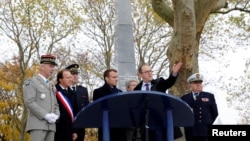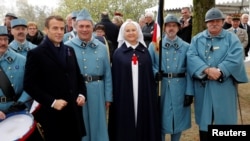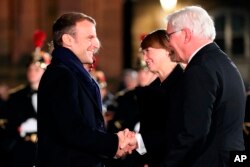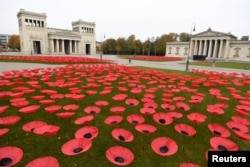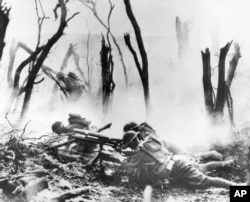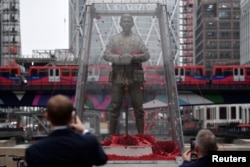Their pain has long gone. No odor from the gas warfare they endured remains. There are no echoes of the thump of artillery, no reverberation of the clash of arms, no sound of fusillades or the rat-a-tat of the machine guns. The trenches have long been filled; the entanglements of harsh wire gone, too. All is quiet on the Western Front.
But the memory remains of the industrial slaughter that was World War I. It echoes for later generations in fading black-and-white photographs, letters home stained with foxing and the poems of war poets like Wilfred Owen. And it echoes in the thoughts of the few surviving sons and daughters, frail and aged themselves, of the fathers who never came home.
And this week in the days leading up to November 11, the centenary of the end of World War I, one of the deadliest conflicts in the history of the human race, testimonies to the carnage are being pored over, discussed and debated.
On Sunday, hundreds of mourners turned up in the French village of Ors — some from as far away as the United States and New Zealand — to retrace the fateful last steps of Wilfred Owen, who died a week before Armistice Day along with hundreds of his fellows trying to cross a canal. They heard the plaintive notes of the Last Post being played on a bugle Owen retrieved from the battlefield.
His last letter home, written while he and his men rested before battle, included this final line: “You could not be visited by a band of friends half so fine as surround me.”
How best to commemorate the "band of friends"? Was it so sweet and fitting to die for one’s country in World War I? Should the victors of the war strike triumphant tones or downplay military victory in order to avoid offending vanquished European neighbors who are now allies?
Some 80 leaders from around the world, including U.S. President Donald Trump and German Chancellor Angela Merkel, will fly into France this week to attend remembrance events marking a century since the guns fell silent on the Western Front. The culmination of the commemorations in France will come with a ceremony at the Arc de Triomphe in Paris on Monday.
French President Emmanuel Macron has been keen to avoid any triumphalism. The tone of Macron’s speech at the Tomb of the Unknown Soldier will be respectful of the millions, regardless of nationality, who died in the four-year conflict, say his officials.
That order has sparked disgruntlement from some military veterans, including Michel Goya, a historian and former colonel, who accused Macron of “insulting the soldiers of 1918.” Military historian Bénédicte Chéron told France’s French Le Figaro newspaper recently that Macron and his ministers misunderstand “the continuity between the engagement of 1914-18 soldiers, and that of soldiers today.”
Nearly 37 million soldiers and civilians are estimated to have been killed in World War I and Macron’s aides say that many people view the 1914-1918 war as an unnecessary slaughter rather than a victory that should be celebrated with too much military pomp. Many in France and across Europe seem to agree with him.
They include veterans like retired British general Richard Dannatt. “Triumphalism, victory, those sort of notions are inappropriate.There is no need for jingoistic reaction at all.” Britain will also mark the centenary with a week of commemorations, small and large. including a display of 10,000 flames illuminating the moat at the Tower of London and a remembrance at Westminster Abbey.
British Prime Minister Theresa May has also struck a note of reconciliation in the run-up to the centenary. “The killing fields of France and Belgium are scarred by the horrors of war, but the strength and closeness of our relationship today is a testament to the journey our countries have traveled together,” she said last week.
How to remember the Great War and its war dead have long been issues, going back even to the conflict itself and its immediate aftermath. The issues have been debated heatedly not only in France but the allied countries of Britain, Belgium, Italy and Russia as well as in the vanquished nations of Germany and Austria.
The sheer scale of the casualties meant that hardly a European household was left untouched by the war. The industrial nature of the killing, which saw young men scythed down by machine guns and obliterated by artillery barrages as well as being poisoned by clouds of noxious fumes, prompted rising despair and, as more men were hurled into the killing machine, accusations of massive miscalculation by national leaders and the senselessness of the fighting mounted.
As the war unfolded in all its horror, many wondered why they had been thrust into such a consuming, barbaric conflict by an assassination in a far-flung country in the Balkans. They questioned what the war was about. For some it was a case of imperial rivalry that had got out of hand. Others countered that right or wrong, one had to defend one’s country.
In Russia, World War I triggered the Bolshevik revolution. In other European countries fury over the carnage fueled the post-war rise of organized labor and parties of the far right and far left. The memory of the war was one of the prompts for Oxford University’s influential debating Union to approve the famous 1933 motion “that this House will in no circumstances fight for its King and Country.”
And there were disputes about the plans for formal remembrance of the conflict. In Britain, the authorities decided that there should be "equality of remembrance," a revolutionary idea, and that all the men should be buried where they fell in war cemeteries on the battlefields of France and Belgium, ordinary soldiers laid to rest beside officers. Other nations followed suit.
Many applauded the idea. But many grief-stricken wives, inconsolable in their bereavement, “disagreed with the decision not to repatriate,” says historian Alison Fell. They wanted their husbands to be buried near to them in their local cemeteries at home and they organized a letter-writing campaign.
They pointed to the offer by the U.S. government to bereaved Americans to bear the costs of shipping bodies back to America, if families so wished. More than 300,000 of France’s dead were returned to their families. In Britain the government ignored repatriation demands.
One British widow wrote that perhaps it is not everyone’s wish to have their dead husbands repatriated, she noted, but I do. She wrote: “The country took him and the country should bring him back.”




